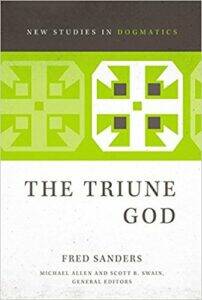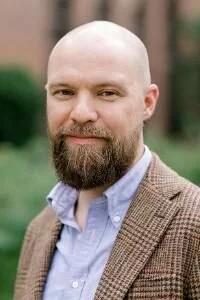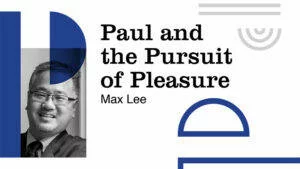Fred Sanders is usually writing about the Trinity.
The burden of his 2010 volume The Deep Things of God was to show how the doctrine of the Trinity “inherently belongs to the gospel.” Years earlier he wrote his dissertation on “Rahner’s Rule” and the immanent Trinity. Then there is his 2016 volume in Zondervan’s New Studies in Dogmatics series The Triune God, over a dozen articles or chapters on the doctrine, a handful of edited volumes, as well as a forthcoming academic monograph. Still not convinced? Try running the search term “Trinity” over at Scriptorium Daily and count the number of times Fred’s name pops up.
But in the spring of 2019 Fred will be joining an interdisciplinary group of scholars in residence with the Creation Project undertaking research on theological anthropology. What gives?
“I promise that I will never be finished with Trinity and Christology,” Fred says. “But for my personal development I have felt a need to branch out, and to find my voice in one of the fields of doctrine a little further removed from the Trinitarian-soteriological core. Of course it’s all related, though.”
That it’s all related is in fact the point of his project.
Fred’s project, “The Doctrine of Humanity in Systematic Perspective” aims to explicate how theological anthropology is shaped by the other doctrines in the Christian theological system. Without neglecting the categories offered by Scripture itself (image of God, flesh and spirit, etc.), his project aims to consider the doctrine of humanity within the tensions, needs, and normative requirements imposed on it by other major doctrines in the organic system of Christian theology—from the doctrines of God through eschatology. For example, Fred says:
Beginning with soteriology, we can ask ‘what must humanity be if it needs salvation and is made capable of salvation?’ I think there is a lot to say in answer to that question. Some of the answer will track comfortably along with what I’ve said in the doctrines of God and Christ, and some of it will be, I think, a corrective, a caution, or a counterbalance. But the whole point of my project is to sketch a theological anthropology that is ‘joined up,’ as the English say.
The Forms of Biblical Reasoning
A surprising amount of recent evangelical books on the science and theology intersection have been written by biblical scholars—one thinks of Scot McKnight’s Adam and the Genome, or the Lost Worlds of John Walton. These works typically focus on the ancient Near Eastern or Greco-Roman context of the original authors and audiences, and (rightly) call us to walk circumspectly when asking modern questions of ancient texts. Fred’s project aims to go further:
The holistic or systematic perspective on doctrine is a form of biblical reasoning. It’s not the kind of commentary-like reasoning that moves along the surface of the text, analyzing the categories delivered by Scripture in the order given by the flow of Scripture. Instead it’s a form or biblical reasoning that works at a higher level of abstraction, comparing and combining categories in order to articulate larger unities that can get lost in the details.
In other words, Fred thinks there’s still plenty of work for the theologian to do after one gets clear about the history of a text:
One way to account for the strengths and weaknesses of modern biblical studies is to note the degree to which its work is dictated by the schemas of historical reasoning. Systematic theology can apprehend patterns that are not evident to merely historical reasoning, and this is helpful in sub-fields where the historical element is not the main thing: little regions like physics and metaphysics, for example.
Theological Anthropology in Websterian Key
If you heard echoes of John Webster in the above, it’s not just you. Fred notes:
Webster’s later musings on the doctrine of creation were important for me. What they showed me is that it’s not enough to get your doctrine of creation right just when you’re writing the section of your theology that’s explicitly about that doctrine. The real test of theological judgment is whether you continue to write all the rest of the theological system in conformity with what is established by the doctrine of creation.
In his later work, Webster turned considerable attention to the doctrine of creation. One of his insights during this period was that There is considerable work to be done maintaining recognition of the creator-creature distinction at some key points throughout the doctrinal system.creation is one of two “distributed doctrines” in Christian theology. The first and most comprehensive distributed doctrine is the Trinity—it conditions, governs, and orients everything else within Christian theology. The second is the doctrine of creation, and it encompasses the totality of God’s works ad extra. In other words, whenever Christian theology is speaking about anything that is not God in himself, it falls under the scope of the doctrine of creation.
Neglecting the distributed nature of these two doctrines—and the distinction between them—has been a common characteristic of modern theology, and evangelical theology hasn’t been an exception. In light of this, Fred’s project aims to maintain a “Websterian vigilance for the creator-creature distinction” in theological anthropology:
It seems to me that there is considerable work to be done maintaining recognition of the creator-creature distinction at some key points throughout the doctrinal system. It’s precisely when we consider certain red-hot, spiritually alive, experientially immediate topics in soteriology that we are tempted to get giddy, and fool ourselves into thinking we may have slipped across the borderline into God’s own Godness. This can be an area in which the strengths of evangelical piety can tip over into weaknesses.
Fred is not innately opposed to warm hearted evangelical religion—he is a Wesleyan after all—he just wants evangelical theology to be red-hot and clear-eyed. “I don’t want to be a theological wet blanket on the religious affections. But precisely in service of spiritual reality, I want to expose optical illusions by redescribing them more accurately.”
Distributed Doctrines in an Age of Science
The Creation Project is decidedly interdisciplinary—it aims to catalyze a field of study around the doctrine of creation that is faithful to Scripture and informed by advances in modern science. And while Fred’s project focuses on the theology side of the theology / science dialogue, he also sees engagement with the claims of modern science as essential to responsible theological work:
Relating science and the Bible is important and inescapable. For most educated people, this connection is pretty much an index of whether your faith is real or imaginary. About twenty years ago in Berkeley, I was happily doing my theological thing, thinking about the Trinity, when a friend pointed out to me that as far as the wider intellectual world was concerned, I could talk about that kind of stuff all I wanted, as long as I didn’t claim it was true. I could also talk about Pegasus and unicorns, under the same conditions.
Of course, this is not to suggest that everything Christians believe should be evaluated by scientists. But it did help Fred see that failure to engage the claims of science (where such claims are relevant) has real world consequences. “Suddenly I realized that if I wanted to permanently avoid issues surrounding creation, I’d have to do so at the high price of looking like I was theologizing about imaginary entities.”
The God Who Creates in Freedom
Fred’s not done writing about the Trinity. And that’s the point—as the first of the two distributed doctrines, the Trinity orients and governs all that Christians say and believe about God and everything else, and this ‘everything else’ includes God’s free decision to create the world. In the spring of 2019 he’ll turn his attention to the work of the triune God in creating humanity, and will no doubt bring the same careful reflection that characterizes his other theological work to bear on the pressing questions in theological anthropology.
It might be tempting to ask why a Trinitarian theologian would spend a semester researching and writing about “theological anthropology in an age of science.” Perhaps the better question is why such an endeavor would strike us as unusual. It’s all related, after all.
2018–19 Henry Resident Fellows
2018–19 Henry Fellows Announced | Learn More
James Hoffmeier, “Why We Believe in Creation & Evolution: A Discussion between an Evolutionary Biologist & an Old Testament Scholar” | Learn More
Fred Sanders, “The Doctrine of Humanity in Systematic Perspective”
Dru Johnson, “Man Made: If Biblical Texts Could Speak to Modern Origins Stories” | Learn More
Ryan Peterson, “Human Identity in Theological Anthropology” | Learn More
Mary VandenBerg, “Retrieving a Substantialist Understanding of the Image of God” | Learn More
Ralph Stearley, “Assessing Evidences for Cognitive Capacities in Ancient Hominins, with Reference to their Perception of God” | Learn More
Joshua Farris, “The Soul of Science and Religion: Theological Anthropology, Substance Dualism, and Origins” | Learn More








Comments
Be the first one to make a comment!